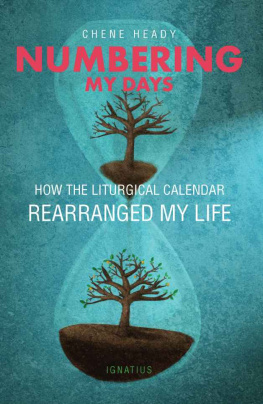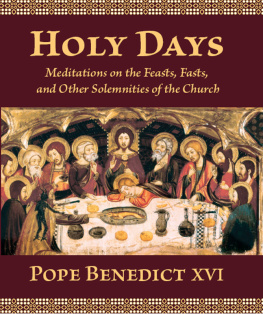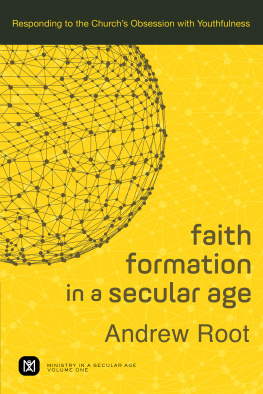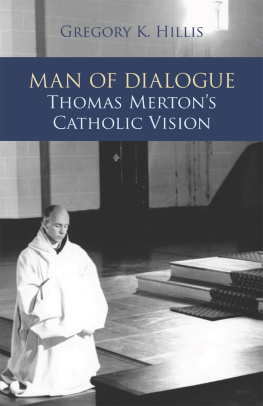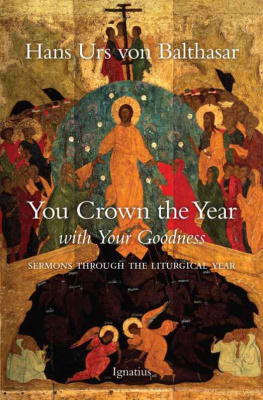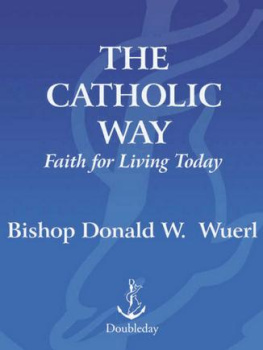NUMBERING MY DAYS
Chene Heady
NUMBERING
MY DAYS
How the Liturgical Calendar
Rearranged My Life
IGNATIUS PRESS SAN FRANCISCO
Excerpts from the Lectionary for Mass for Use in the Dioceses of the United States of America, second typical edition 2001, 1998, 1997, 1986, 1970 by the Confraternity of Christian Doctrine, Inc., Washington, DC.Excerpts from the English translation of The Roman Missal 2010 by the International Commission on English in the Liturgy Corporation. All rights reserved. GODS WORD is a copyrighted work of Gods Word to the Nations. Quotations are used by permission. 1995 by Gods Word to the Nations. All rights reserved.Excerpt from This Be the Verse from The Complete Poems of Philip Larkin by Philip Larkin, edited by Archie Burnett. 2012 by The Estate of Philip Larkin. Reprinted by permission of Farrar, Straus and Giroux, LLC.
Cover Art and Design by Enrique J. Aguilar Pinto
2016 by Ignatius Press, San Francisco
All rights reserved
ISBN 978-1-62164-031-8 (PB)
ISBN 978-1-68149-711-2 (EB)
Library of Congress Control Number 2015948812
Printed in the United States of America
CONTENTS
( Advent and Christmas Time )
( Ordinary Time, Round 1 )
( Lent and Holy Week )
( Easter Time )
( Ordinary Time, Round 2, Part 1 )
( Ordinary Time, Round 2, Part 2 )
( Ordinary Time, Round 2, Part 3 )
( Ordinary Time, Round 2, Part 4 )
INTRODUCTION:
THE TRIVIAL ROUND,
THE COMMON TASK
I walk into the local coffee shop carrying my year-and-a-half-old daughter, Beatrice, the many pockets of my thin tan trench coat flapping in the fall breeze. Hi, Bea! the manager shouts out in her raspy voice when were barely through the door. She is in her early twenties, with long, untamed wavy brown hair and the affably obnoxious disposition and settled figure of a barfly. She doesnt seem like she would have much interest in families with small childrenand, in point of fact, she has never learned my namebut she does have a weakness for Bea (the only baby Ive ever seen who doesnt look like Winston Churchill).
And, as surely as Bea has a weakness for frilly lace dresses, she has a weakness for the coffee shop. She loves the ambient acoustic and jazz music, and, especially, the baked goods. She raises her stuffed flamingo toward the manager as a kind of salute (she never took to a teddy bear). Hows it hanging, Mingo? the manager barks. Mingo, who is by now a linty blue gray with lingering pink highlights, answers her by jumping up and down. I am apparently the least memorable figure in our entourage.
I order a large coffee, and the manager asks, What would you like today, Miss Beatrice?
A croiss-ant, she replies, in two distinct syllables, each with an emphatic nod of the head that tosses her light brown bob cut back and forth.
I plop Beatrice into the coffee shops tiny wheeled high chair. She fits easily in the chair, though her long, thin arms and legs stick out in all directions. We careen toward our table, passing it deliberately, then rapidly doubling back, spinning around, and making an abrupt stop exactly at Beatrices usual seat. She giggles with amusement and whiplash. We annoy only the couple of customers optimistic enough to conduct a job interview in a coffee shop, and we have our fans among the regulars. A rail-thin retired schoolteacher always stops by the table to compliment Beatrices manners, and a UPS driver with a prominent mustache persistently tries to get conversation out of Mingo.
I pick up our coffee and croissant and return to the table. Out of one of my many pockets, I pull Beatrices sippy cup of juice; out of another, I grab a copy of the Victorian poet John Kebles collection The Christian Year . I begin breaking up the croissant into tiny bits. Beatrice goes right for the croissant, but I have trouble focusing on my book, since I can barely stay awake.
I havent had a decent nights sleep since my daughter was born. Not long ago, I got my first traffic ticket in sixteen years; head tilted toward the shoulder, eyes just slits, I zoned out and rear-ended a nurse. Now I drink eighty ounces of coffee each day just as a baseline; on truly sleepy days like today, I average about one hundred twenty. My wife, Emily, and I both teach English at colleges in central Virginia (she is also an administrator). I teach mornings and watch Beatrice in the afternoon; Emily teaches afternoons and watches Beatrice in the morning; my wifes parents, who live in town and are retired, graciously cover the interval. I recently realized that my wife and I literally havent fifteen minutes free a day. Once, on a brief pause between activities, I asked Emily why she was doing the dishes (which is normally my job). I had ten minutes free and I wasnt going to spend ten minutes just sitting around, she replied matter-of-factly. I had to explain to her later why someone else might find this remark funny. We rise at 4:45 A.M. when our daughter starts crying, and we finish our schoolwork and begin our broken sleep at about midnight. Psychologists tell us that dreams often function as a kind of wish fulfillment, compensating for what we feel to be lacking in our daily lives. I have a recurring dream in which I am blissfully asleep.
Daddy? Beatrice asks from across the table, snapping me out of my thoughts.
Yes, Bea?
What we doing now, Daddy?
How about Old McDonald? I ask. She nods happily and immediately begins: Old McDonald adda farm... yiy, yiy, yiy, yiy, oh! She loves to talk and she loves to sing; words perpetually bubble out of her. She will gladly sing that songas nearly as an unusually verbose toddler can enunciate itover and over again for a good hour. I just have to chime in every once in a while and suggest a new animal (Rooster? How about rooster?). If she is particularly agitated, I push her high chair back and forth with my foot.
Were at the coffee shop this afternoon because my wife has a late meeting. I need coffee, I need to reread selections from Kebles Christian Year for a class I am teaching on religion and literature, and I need to watch Beatrice. So, of course, I am doing all three things at once. I state the situation to myself plainly: I am shoving bits of croissant at my daughter across the table so she doesnt interrupt me while I work. I am a horrible person.
I open The Christian Year to the second poem, Morning, but I still cant manage to focus. I love my daughter and I love my wife, but mostly I am bored, depressed, and listless. My life is a giant series of tasks to be performed, and most moments are like this one: I focus on no one thing and I am mentally present to no one. I dont want to exaggerate: objectively, nothing has gone dramatically wrong for me, and I have committed no flamboyant sins. Mortal sins generally require planning and commitment, and I have had neither the energy nor the time. But the days drag on, and everything seems empty. I am detached and disaffected, stretched thin and scattered. I feel guilty about feeling this wayI worry that it makes me a bad husband and a bad fatherbut I cant shake it just by wishing. Daddy... , Beatrice calls out.
Dog, I reply, and the next verse of Old McDonald begins.
Not only do I feel like a bad husband and father, but I feel like a bad Catholic. My sense that the world is meaningless and my life empty simply cant be squared with my Catholic Faith. The Faith declares that nothing is without significance. The world is charged with the grandeur of God, as Gerard Manley Hopkins exclaimed in his poem Gods Grandeur. In the Mass, the priest proclaims that the fruit of the earth and work of human hands... will become for us the bread of life, and the fruit of the vine and work of human hands... will become our spiritual drink. When we reply, Blessed be God forever, we affirm that the elements of daily life can, through the power of God, take on a literally divine significance. The trivial and the quantifiable can become the transcendent. But obviously at a gut level, I dont really believe it. Day by day, I transform the transcendent into the trivial and the quantifiable. There is a disconnect between my faith and my life.
Next page
